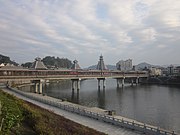Huangzhou Wind-rain Bridge
Huangzhou Wind-rain Bridge 晃州风雨桥 | |
|---|---|
 The South Gateway of Huangzhou Wind-rain Bridge. | |
| Coordinates | 27°22′15″N 109°11′02″E / 27.370842°N 109.183904°E |
| Carries | Motor vehicles, pedestrians and bicycles |
| Crosses | Wu River |
| Locale | Huangzhou, Xinhuang Dong Autonomous County, Hunan, China |
| Characteristics | |
| Material | Concrete, steel, wood |
| Total length | 220 metres (720 ft) |
| Width | 120 metres (390 ft) |
| Traversable? | Yes |
| Longest span | 240 metres (790 ft) |
| Piers in water | 5 |
| No. of lanes | 2 |
| History | |
| Designer | Hunan Huaihua Highway Survey and Design Institute Guizhou Qiandongnan Architectural Design Institute |
| Constructed by | Xinhuang Dong Autonomous County Economic Construction Investment Company Transportation Bureau of Xinhuang Dong Autonomous County Hunan Railway Engineering Co., Ltd Hunan Xingda Construction Group Co., Ltd |
| Construction start | March 2011 |
| Construction end | January 2014 |
| Construction cost | 29.8 million yuan |
| Opened | 26 January 2014 |
| Inaugurated | 26 January 2014 |
| Location | |
 | |
The Huangzhou Wind-rain Bridge (simplified Chinese: 晃州风雨桥; traditional Chinese: 晃州風雨橋; pinyin: Huǎngzhōu Fēngyǔ Qiáo) is a beam bridge over the Wu River in the town of Huangzhou, Xinhuang Dong Autonomous County, Hunan, China. Completed on January 26, 2014, it has a main span of 240-metre (790 ft) and total length of 220-metre (720 ft).[1]
Name
[edit]The name of "Huangzhou" named after the town of "Huangzhou", where the bridge located.
History
[edit]Construction of the main body began in March 2011 and was completed in June 2013.[1] Construction of the covered bridge began in June 2013 and was completed in January 2014.[1] It costs more than 29.8 million yuan. Two gateways (门楼) and five drum towers (鼓楼) on the bridge. Parapet panels (栏板), railing posts (望柱) and round Baogu stones (抱鼓石) are carved in patterns and shapes representing ancient Chinese sculpturing art. The most representative of the bridge railing carvings include Chinese dragons, Qilin, Fenghuang, and birds.[2]
Gallery
[edit]References
[edit]- ^ a b c Zhang Jiaquan (张家权) (2014-01-27). 新晃晃州风雨桥26日踩桥通车(图). rednet.cn (in Chinese). Retrieved 2020-04-05.
- ^ Jiang Yuewei et al. (2006), p. 69.
Bibliography
[edit]- Jiang Yuewei; Pu Shishu; Shu Weixiu; Chen Shouhua, eds. (2006). "Strange Scenery: Beidong Wind-rain Bridge" 奇异的景致:北侗风雨桥. 新晃侗族自治县五十周年大写意 [50th Anniversary of the Establishment of Xinhuang Dong Autonomous County] (in Chinese). Hong Kong: Boya Publishing House. ISBN 988-98919-1-3.



